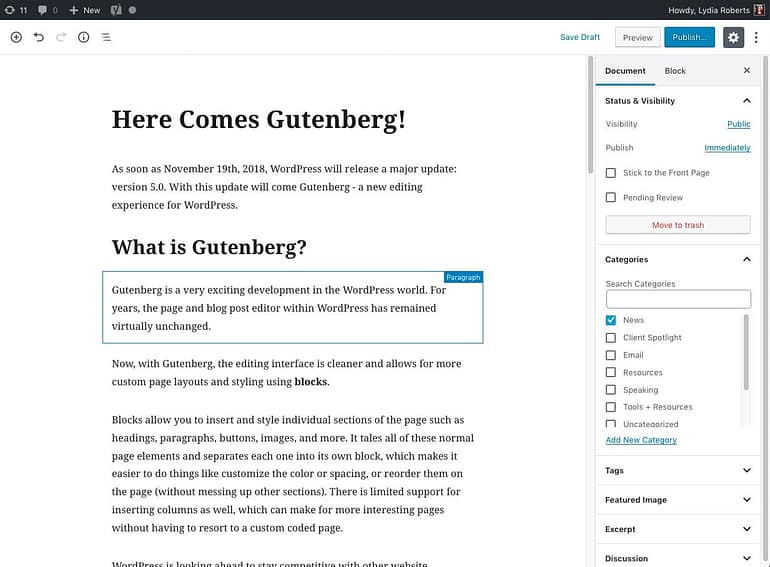
As soon as November 19th, 2018, WordPress will release a major update: version 5.0. With this update will come Gutenberg – a new editing experience for WordPress.
What is Gutenberg?
Gutenberg is a very exciting development in the WordPress world. For years, the page and blog post editor within WordPress has remained virtually unchanged.
Now, with Gutenberg, the editing interface is cleaner and allows for more custom page layouts and styling using blocks.
Blocks allow you to insert and style individual sections of the page such as headings, paragraphs, buttons, images, and more. It tales all of these normal page elements and separates each one into its own block, which makes it easier to do things like customize the color or spacing, or reorder them on the page (without messing up other sections). There is limited support for inserting columns as well, which can make for more interesting pages without having to resort to a custom coded page.
WordPress is looking ahead to stay competitive with other website platforms. And, they envision a time may come when the entire website will work using blocks, so that it can be viewed on any kind of device imaginable – not just the phones, tablets, and laptops that we have today. It is a forward-thinking vision and one that I’m truly excited about.
How will Gutenberg affect my WordPress website?
So far, Gutenberg seems to have very good compatibility with the websites I have tested it on. I have not seen any visual issues on sites that I have built. However, I will continue to test, and in the meantime am using the Classic Editor plugin to suppress Gutenberg until my tests are complete.
If your site uses the Divi theme, you may continue to use the Visual Builder to view and create pages. Gutenberg will be available as an option, but you’ll likely continue to use the Visual Builder, since it’s still a much more robust editing experience than Gutenberg.
The general consensus is that Gutenberg will not replace editors like Divi. However, over time there may be many more blocks and custom blocks available from WordPress and independent developers. This means the way we build WordPress sites will continue to evolve, and we have more tools at our disposal to create sites in a way that work best for each individual client — and I love that!
Where can I learn more?
There are lots of resources available that show examples of Gutenberg in action.
- Demo of Gutenberg from WordPress
- Divi Support for Gutenberg
- A Tour of Gutenberg by WPMU Dev
- WordCamp US Talk: Gutenberg and the WordPress of Tomorrow
Check it out and tell me: are you excited about Gutenberg? Nervous, perhaps?
What do you look forward to doing with Gutenberg editor that you couldn’t do before?

